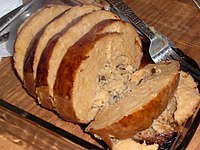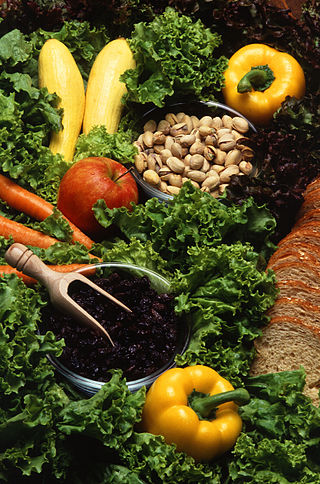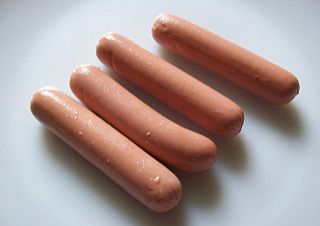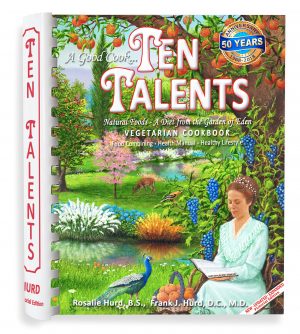
This is a list of vegetarian and vegan companies that do not use animal products or animal-based products in their goods. Such companies include food manufacturers and cosmetics companies, among others.

This is a list of vegetarian and vegan companies that do not use animal products or animal-based products in their goods. Such companies include food manufacturers and cosmetics companies, among others.





Vegetarian cuisine is based on food that meets vegetarian standards by not including meat and animal tissue products.

The soybean, soy bean, or soya bean is a species of legume native to East Asia, widely grown for its edible bean, which has numerous uses.

Textured or texturized vegetable protein (TVP), also known as textured soy protein (TSP), soy meat, or soya chunks, is a defatted soy flour product, a by-product of extracting soybean oil. It is often used as a meat analogue or meat extender. It is quick to cook, with a protein content comparable to some meats.

A meat alternative or meat substitute, is a food product made from vegetarian or vegan ingredients, eaten as a replacement for meat. Meat alternatives typically approximate qualities of specific types of meat, such as mouthfeel, flavor, appearance, or chemical characteristics. Plant- and fungus-based substitutes are frequently made with soy, but may also be made from wheat gluten as in seitan, pea protein as in the Beyond Burger, or mycoprotein as in Quorn. Alternative protein foods can also be made by precision fermentation, where single cell organisms such as yeast produce specific proteins using a carbon source; as well as cultivated or laboratory grown, based on tissue engineering techniques.

Soy milk, also known as soya milk or soymilk, is a plant-based drink produced by soaking and grinding soybeans, boiling the mixture, and filtering out remaining particulates. It is a stable emulsion of oil, water, and protein. Its original form is an intermediate product of the manufacture of tofu. Originating in China, it became a common beverage in Europe and North America in the latter half of the 20th century, especially as production techniques were developed to give it a taste and consistency more closely resembling that of dairy milk. Soy milk may be used as a substitute for dairy milk by individuals who are vegan or lactose intolerant.

A milk substitute is any substance that resembles milk and can be used in the same ways as milk. Such substances may be variously known as non-dairy beverage, nut milk, grain milk, legume milk, mock milk and alternative milk.

Silk is an American brand of dairy-substitute products currently owned by Danone after it purchased WhiteWave Foods in 2016.

Morningstar Farms is a division of the Kellogg Company that produces vegan and vegetarian food. Many of their offerings are plant-based variations of traditionally meat products. Their products include meatless chicken nuggets, popcorn chicken, corn dogs, breakfast sausage, burgers, hot dogs, bacon, and pizza snack rolls with vegan cheese. Originally, Morningstar offered some, but not all vegan products. In 2019, Morningstar Farms announced all products would be vegan by 2021, but had not yet done so as of December 2022.

A vegetarian hot dog is a hot dog produced completely from non-meat products. Unlike traditional home-made meat sausages, the casing is not made of intestine, but of cellulose or other plant-based ingredients. The filling is usually based on some sort of soy protein, wheat gluten, or pea protein. Some may contain egg whites, which would make them unsuitable for a lacto-vegetarian or vegan diet.

Alpro is a European company based in Ghent, Belgium, that markets organic and non-organic, non-genetically modified, plant-based products, such as foods and drinks made from soy, almonds, hazelnuts, cashew, rice, oats or coconut. Alpro employs over 1,200 people in Europe and has three production facilities in Belgium, France and the United Kingdom. Alpro markets its products in Europe and beyond with the majority of its business in Europe.

Tofu is a food prepared by coagulating soy milk and then pressing the resulting curds into solid white blocks of varying softness: silken, soft, firm, extra firm. Tofu is also known as bean curd in English. It is a traditional component of East Asian and Southeast Asian cuisines that has also been consumed in China for over 2,000 years. In modern Western cooking, it is most often treated as a meat substitute.
The Sahmyook Foods is a Seventh-day Adventist Church food company in South Korea that produces a large range of soy milks as well as a range of vegetarian products. Sahmyook Foods owns three factories, the oldest being in Choongnam; the second being in Wanju-gun, Jeonbuk and the third being in Bonghwa-gun, Kyungbuk. Sahmyook Foods has received five management awards since 2004. 60% of Sahmyook Foods market is in the United States, while 40% of its market is in Korea.

Plamil Foods Is a British manufacturer of vegan food products. Founded in 1965, the company has produced and pioneered soy milk, egg-free mayonnaise, pea-based milk, yogurts, confection bars and chocolate.
Danone North America is a consumer packaged food and beverage company based in White Plains, New York, U.S, that manufactures, markets, distributes, and sells branded premium dairy products, plant-based foods and beverages, coffee creamers, and organic produce throughout North America and Europe.

Vegan cheese is a category of non-dairy, plant-based cheese analogues. Vegan cheeses range from soft fresh cheeses to aged and cultured hard grateable cheeses like plant-based Parmesan. The defining characteristic of vegan cheese is the exclusion of all animal products.
La Loma Foods, formerly named Loma Linda Food Company and Loma Linda Foods, and with products presently branded under the name Loma Linda and Loma, is a former food manufacturing company that produced vegetarian and vegan foods. It is presently an active brand of vegetarian and vegan food products produced and purveyed by the Atlantic Natural Foods Company of Nashville, North Carolina. Loma Linda Foods began operations in 1905 under the name The Sanitarium Food Company and was owned by the Seventh-day Adventist Church until 1990.

Ten Talents is a vegetarian and vegan cookbook originally published in 1968 by Rosalie Hurd and Frank J. Hurd. At the time, it was one of the few resources for vegetarian and vegan cooks. The cookbook promotes Christian vegetarianism and a Bible-based diet, in keeping with teachings of the Seventh-day Adventist Church. By 1991, the 750-recipe cookbook was entering its 44th printing and had sold more than 250,000 copies. An expanded edition with more than 1,000 recipes was issued in 2012.

Harry Willis Miller was an American physician, thyroid surgeon and Seventh-day Adventist missionary. Miller was a vegetarian and pioneer in the development of soy milk.
William Roy Shurtleff also known as Bill Shurtleff is an American researcher and writer about soy foods. Shurtleff and his former wife Akiko Aoyagi have written and published consumer-oriented cookbooks, handbooks for small- and large-scale commercial production, histories, and bibliographies of various soy foods. These books introduced soy foods such as tofu, tempeh, and miso on a wide scale to non-Asian Westerners, and are largely responsible for the establishment of non-Asian soy food manufacturers in the West beginning in the late 1970s. In 1980, Lorna Sass wrote in The New York Times, "The two people most responsible for catapulting tofu from the wok into the frying pan are William Shurtleff and Akiko Aoyagi.” In 1995, Suzanne Hamlin wrote in The New York Times, “At the turn of the century there were two tofu suppliers in the United States. Today there are more than 200 tofu manufacturers...and tofu can be found in nearly every supermarket."